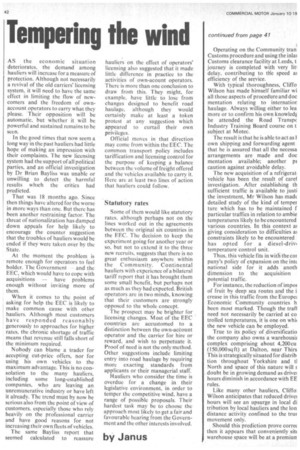Tempering the wind
Page 44

If you've noticed an error in this article please click here to report it so we can fix it.
AS the economic situation deteriorates, the demand among hauliers will increase for a measure of protection. Although not necessarily a revival of the old carriers' licensing system, it will need to have the same effect in limiting the flow of newcomers and the freedom of ownaccount operators to carry what they please. Their opposition will be automatic, but whether it will be powerful and sustained remains to be seen.
In the good times that now seem a long way in the past hauliers had little hope of making an impression with their complaints. The new licensing system had the support of all political parties, and an official investigation by Dr Brian Bayliss was unable or unwilling to detect the harmful results which the critics had predicted.
That was 18 months ago. Since then things have altered for the worse in more ways than one. But there has been another restraining factor. The threat of nationalization has damped down appeals for help likely to encourage the counter suggestion that the troubles of hauliers would be ended if they were taken over by the State.
At the moment the problem is remote enough for operators to feel bolder. The Government and the EEC, which would have to cope with acquisitions — have problems enough without inviting more of them.
When it comes to the point of asking for help the EEC is likely to make common cause with other hauliers. Although most customers have responded reasonably generously to approaches for higher rates, the chronic shortage of traffic means that revenue still falls short of the minimum required.
Nobody can blame a trader for accepting cut-price offers, nor for using his own vehicles to the maximum advantage. This is no consolation to the many hauliers, including some long-established companies, who are leaving an unremunerative industry or have left it already. The trend must by now be serious also from the point of view of customers, especially those who rely heavily on the professional carrier and have good reasons for not increasing their own fleets of vehicles.
The same Bayliss report that seemed calculated to reassure hauliers on the effect of operators' licensing also suggested that it made little difference in practice to the activities of own-acount operators. There is more than one conclusion to draw from this. They might, for example, have little to lose from changes designed to benefit road haulage, although they would certainly make at least a token protest at any suggestion which appeared to curtail their own privileges.
Official moves in that direction may come from within the EEC. The common transport policy includes tariffication and licensing control for the purpose of keeping a balance between the volume of freight offered and the vehicles available to carry it. Here are at least two lines of action that hauliers could follow.
Statutory rates
Some of them would like statutory rates, although perhaps not on the lines worked out in the agreements between the original six countries in the EEC. The decision to keep the experiment going for another year or so, but not to extend it to the three new recruits, suggests that there is no great enthusiasm anywhere within the Community. Continental hauliers with experience of a bilateral tariff report that it has brought them some small benefit, but perhaps not as much as they had expected. British operators are in two minds, knowing that their customers are strongly opposed to the whole concept.
The prospect may be brighter for licensing changes. Most of the EEC countries are accustomed to a distinction between the own-acbount operator and the carrier for hire or reward, and wish to perpetuate it. Proof of need is not the only method. Other suggestions include limiting entry into road haulage by requiring more exacting standards from applicants or their managerial staff.
Hauliers who consider the time is overdue for a change in their legislative environment, in order to temper the competitive wind, have a range of possible proposals. Their hardest task may be to choose the approach most likely to get a fair and favourable hearing from the Government and the other interests involved.
by Janus




































































































